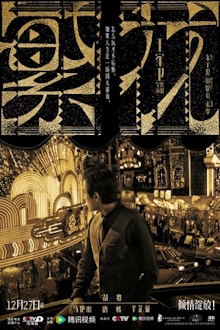This being the first television series made by Wong Kar-Wai, I thought I should at least check out a few episodes of it. I thought for sure that it would be released for foreign markets given Wong’s fame and so waited a while for it but it never did. In the event, I had to watch the original version with the Shanghainese language and Chinese subtitles, which is a real pain for me. The first two or three episodes were downright terrible. Too fast paced, too much posing and too little of substance. It gets better when it slows down by episode four and we can finally tell who’s who and what is going on. Even so I stopped at episode five because the full thirty episodes is way too much and there’s a lot that I don’t understand. Watching it properly would be a fascinating but rather taxing project.
In the 1990s, China is at the beginning of the reforms that would make it the economic superpower it is today. In Shanghai, there is a palpable sense of excitement in the air as everyone is in a rush to get rich. This show follows the career of one such young man A Bao who seeks out the elderly Uncle Ye to be his mentor. Following his advice, A Bao rents a suite at the Peace Hotel on Huanghe Road as their base of operations and solicits starting capital from his friends. He uses the money to invest in the newly opened stock market and as his mentor’s predictions prove eerily correct, becomes a rising star of the business world. In addition to Uncle Ye advising him, he has Miss Wang of the foreign trade building acting as his intermediary and frequently meets associates at a restaurant run by one of his investors Ling Zi. Meanwhile a seemingly wealthy woman Li Li arrives in town to take over and reopen a shut down restaurant across the street. She refurbishes the place into the trendiest and most luxuriously appointment restaurant around, seemingly determined to make it the location of choice where businessmen make their deals.
Having watched so little of it and not even being able to understand everything that I did see, my comments are naturally limited. It’s interesting that at times the show reverts to a documentary-style exposition to explain to viewers historical facts such as when the stock market was first available to the general public and how it worked. It makes the pacing awkward but it is educational. As stated earlier, it moves very fast at the beginning as it throws all these characters and the status quo of Shanghai at you. A Bao goes from an ordinary man in the street to one of the major movers and shakers in the city in a single episode as Uncle Ye tells him exactly which financial moves to make and even hires tailors to dress him for the part. As far as I can tell, Wong Kar-Wai has no interest in showing A Bao or indeed anyone else, as anything other than at their most glamorous, stylishly dressed best. A large part of the appeal of this show is what I might call period luxury porn as the camera fixates on the characters flaunting their fashion choices and the glitter of the restaurants and hotels. The product placement is blatant and it’s funny how businessmen going to eat dinner is treated like celebrities arriving for an awards event.
The series does do some interesting things. I was confused at first at the tussle over a sales contract but no one talks about what the guy is actually selling. It is only later that we find out he represents a factory making shirts and it’s a real historical point. Similarly the Miss Wang character is heavily involved in the negotiations but we have no idea what role she actually plays for a long time. We only realize later by implication that she works for some kind of Shanghai-based governmental body. I’m sure that the series will continue with this technique of just showing the characters first and backfilling their relationships with A Bao later. It makes things confusing but perhaps it works to draw in some types of audiences.
I’m sure I’ll learn a lot if I put in the time and effort to watch this properly. It very much exemplifies the Chinese dictum that business is about forging relationships as apparently restaurants are where most deals are hashed out. There might even be good insights into how the government is involved in the economy. But as I dislike the excessive showiness of the visuals and the shallowness of the characters, I probably wouldn’t enjoy it very much.
